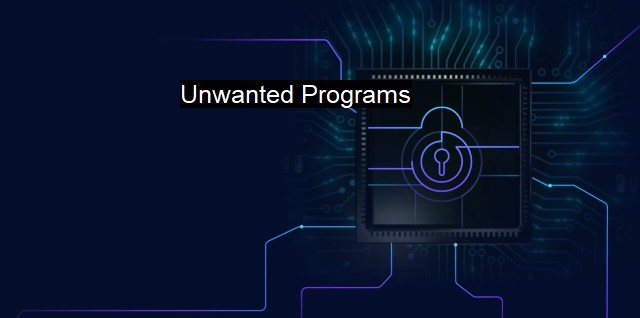What are Unwanted Programs?
Dealing with Unwanted Programs and Malware: Threats and Defensive Measures for Protecting Personal Information and Devices
"Unwanted Programs" refer to software applications that are installed on a computer, smartphone, tablet, or other mobile devices without the user's knowledge or explicit permission. These are also termed as Potentially Unwanted Programs (PUPs), some of which could carry malicious intent and pose a significant threat to the security and privacy of the user's data and information.Unwanted programs are designed to perform functions that are diverse and often detrimental. They could serve as a medium for adware, spyware, ransomware, or channeled towards more devious functionalities like stealing sensitive data, tracking your digital activity or posing as rouge security software that claims to protect but instead infects the system.
Adware, a classic example of unwanted programs, floods the users with unsolicited advertisements, making the user interfaces clunky and difficult to navigate. More dangerously, some adware can manipulate browser settings, redirect search requests to advertising websites or download additional unwanted software.
The entry of such programs does not typically result from voluntary download or purposely intended installation by users. Instead, they often 'piggyback' their installation with other desired programs prompting the user inadvertently to install them by marking them as default or recommended additional programs. Software bundling is a widely used mechanism by various free software providers to offset development costs by agreeing with third-party vendors to include PUPs within their software download files.
PUPs are notorious for their deceptive installation techniques. Functioning in a grey zone of promotional tactics and user agreement loopholes, they prompt baffled users to agree to their installation. Their removal presents another challenge. Unwanted programs embed themselves into multiple system locations, making it difficult for regular uninstall procedures to completely remove them from the system.
This is where antivirus software plays a crucial role. Good antivirus software not only targets traditional viruses and malware but includes the removal of unwanted programs as a substantial part of their protection services. Notably, such software uses behavioral tracking to identify immodest behavior by any applications and employs advanced heuristics to get an edge over the obfuscated and continuously evolving codes that undesirable programs tend to proliferate.
Antivirus scans your system continuously for any previously flagged or suspicious software behavior and eliminates the derogatory ones, safeguarding your system's background operations. The antivirus also offers anti-phishing, firewalls, and supplement what your standardized in-build defenses lack outright, making them crucial for Wisely guarded cybersecurity architecture.
While we think unwanted programs as offensive in terms of cybersecurity may seem exaggerated, they represent the myriad facets of ponderous security threats posed. They are one of the major venues that cybercriminals and hackers use to explicate sensitive personal or financial data for nefarious ends.
Contrary to popular belief, unwanted programs are not only restricted to individual end-user systems but also infiltrate larger business networks, affecting corporate security at large. Phishing, spoofing, and impact on business-critical and financially significant databases can have crippling consequences for organizations.
In conclusion a solid cybersecurity strategy prioritizing regular updating of operating system, a robust firewall setup, and a good quality antivirus program that effectively scans for viruses, malware, and PUPs is key to maintaining a healthy, efficient, and secured system. Completely abstaining from downloading any third-party software from unverified or suspicious sources, carefully reading installation prompts, and routinely monitoring your installed programs can mitigate any potential damage by an unwanted program. Despite measures, it is prudent to have reliable backup programs installed and employ the best practices regarding personal data handling and browsing habits, staying vigilant to the evolving tactics of cyber-criminals.

Unwanted Programs FAQs
What are unwanted programs in terms of cybersecurity and antivirus?
Unwanted programs, also known as Potentially Unwanted Programs (PUPs), are software applications that are often installed on a user's computer without their knowledge or consent. These programs are not necessarily harmful like viruses or malware, but they can cause harm in terms of system performance, privacy, and security.How do unwanted programs get installed on a user's computer?
Unwanted programs can be installed through various means, such as bundled with legitimate software downloads, through malicious email attachments or links, or through pop-ups and ads on the internet.What are the risks of having unwanted programs on a computer?
Unwanted programs can slow down system performance, cause crashes and errors, and compromise privacy by collecting and transmitting user data. They can also expose the computer to other security threats such as viruses and malware.How can users remove unwanted programs from their computer?
Users can remove unwanted programs manually through the Control Panel or by using antivirus software that can identify and remove PUPs. It is also important to regularly scan the system for any unwanted programs and to avoid downloading software from untrusted sources to prevent future infections.| | A | | | B | | | C | | | D | | | E | | | F | | | G | | | H | | | I | | | J | | | K | | | L | | | M | |
| | N | | | O | | | P | | | Q | | | R | | | S | | | T | | | U | | | V | | | W | | | X | | | Y | | | Z | |
| | 1 | | | 2 | | | 3 | | | 4 | | | 7 | | | 8 | | |||||||